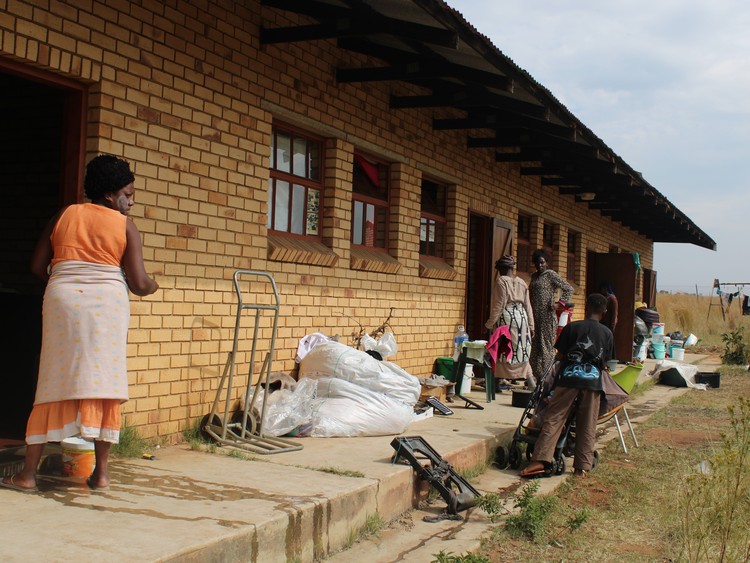Refugees evicted from UNHCR offices find shelter in an old school
The building does not have toilets or electricity. But the refugees say it is better than Lindela Repatriation Centre
Refugees are living in four rooms at this old school in Bronkhorstpruit, Gauteng, after being evicted from the outside of the UNHCR offices in Pretoria last week. Photos: Kimberly Mutandiro
- A group of refugees who were evicted from outside the Pretoria offices of the United Nations High Commissioner for Refugees (UNHCR) last Friday, have moved into an old school building in Bronkhorstpruit.
- The families had camped outside the UNHCR offices for a year, refusing to return to their country of origin. They do not want to live in South Africa.
- With nowhere else to go, the group who refused to be taken to the Lindela repatriation centre, were offered accommodation in an old school.
Refugees who were evicted from outside the Pretoria offices of the United Nations High Commissioner for Refugees (UNHCR) last Friday are now living in an old school building in Bronkhorstpruit, between Pretoria and Emalahleni.
The group of 33 families had been camped outside the UNHCR offices for the past year. The refugees refuse to return to their country of origin and do not want to live in South Africa.
An eviction order was granted by the Pretoria High Court in August 2022 and the eviction was finally carried out on 21 April. According to the UNHCR, only 15 people have taken up the option to be housed at Lindela. The others chose to live on the streets with their children and belongings until Sophia Williams of Mountains and Valleys Ministries offered the refugees shelter in one of their old schools.
The old school building in Bronkhorstspruit is remote, with four rooms but no electricity, and only two toilets which are not in a good state. There is one water tap a few metres away. The refugees have very little food, but they prefer to be there than in Lindela.
Some families are yet to be reunited after being separated during the eviction.
Williams told GroundUp that the arrangement at the old school building would only be temporary and another solution would be found.
“When l saw the small children and how these people were being mistreated on TV with no one to come to their rescue, my heart bled. We were more than happy to take them in,” said Williams.
Williams said her ministry organisation offers accommodation to homeless people and rehabilitation to drug users, but with very limited resources.
The refugees have also received support from the University of Pretoria and the University of South Africa (UNISA).
After arriving in Bronkhorstpruit, the refugees say, they were visited by police who threatened to arrest them. But Williams said the problem has since been resolved.
Omari Mwingwa Kikuna said he is yet to be reunited with his wife and three children from whom he was separated during the eviction. He said officials had assured him that his family will be brought to him soon.
Felix Kitofo told GroundUp that he is happy to be with his family after enduring trauma back in the Democratic Republic of Congo and again during xenophobic attacks in South Africa.
Mwingwa, originally from Manyima in the Democratic Republic of Congo, was previously separated from his family for two years in 2019 when he was taken to Kgosi Mampuru prison after the refugee protests. He had been attacked at a shop he worked at during the 2019 xenophobic attacks in Sunnyside, Pretoria.
He said he still hoped to be taken to another country with his family.
Felix Kitofo, a father of four, also wants to leave. He said he had lost everything during the xenophobic attacks. “The UNHCR has failed to help us resettle in another country.”
He said his relatives had been killed in the DRC.
Bibichie Lukolo has a three-months-old baby. She said living without electricity is hard but she is grateful not to be at Lindela with her baby.
Laura Padoan, spokesperson for UNHCR, said, “We are in regular communication with Lawyers for Human Rights who are in touch with the refugees. We understand that donations are coming in to support them. We hope that their basic needs are being met, especially those of the children, and that after some time, they can integrate back into the community.”
The families have made a makeshift cooking area where they prepare the little food that has been donated to them.
Support independent journalism
Donate using Payfast

Don't miss out on the latest news
We respect your privacy, and promise we won't spam you.
Next: Makhanda literacy project shows dramatic results
Previous: Celebrating Langa through its artists
© 2023 GroundUp. This article is licensed under a Creative Commons Attribution-NoDerivatives 4.0 International License.
You may republish this article, so long as you credit the authors and GroundUp, and do not change the text. Please include a link back to the original article.
We put an invisible pixel in the article so that we can count traffic to republishers. All analytics tools are solely on our servers. We do not give our logs to any third party. Logs are deleted after two weeks. We do not use any IP address identifying information except to count regional traffic. We are solely interested in counting hits, not tracking users. If you republish, please do not delete the invisible pixel.



